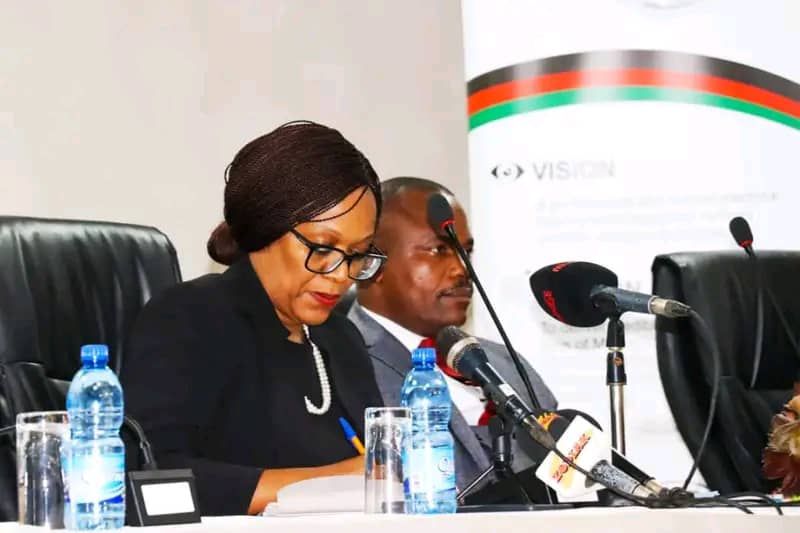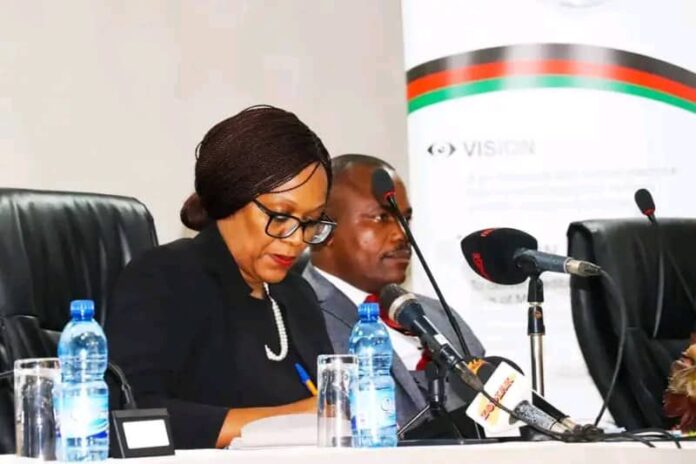By Burnett Munthali
In a recent press briefing, the Chairperson of the Malawi Electoral Commission (MEC), Justice Annabel Mtalimanja, delivered a comprehensive speech outlining the key details of the supplementary voter registration exercise set to take place in Malawi. The announcement has sparked widespread attention and discussions about the commission’s preparedness for the upcoming elections, the inclusivity of the process, and its potential to enhance voter participation across the country.
Justice Mtalimanja began her speech by emphasizing the critical importance of the supplementary voter registration process. She explained that the exercise aims to ensure that all eligible citizens, particularly those who have turned 18 after the previous voter registration period or who have not registered for any other reason, have an opportunity to be included in the electoral process.
The supplementary registration is not only for first-time voters but also for those who have changed their residential address, lost their voter cards, or whose voter registration details have been compromised. By addressing these needs, the MEC aims to create an updated and comprehensive voter register that reflects the current electoral demographic.

“We must ensure that every eligible citizen has the opportunity to participate in the democratic process. Our goal is to provide an inclusive, transparent, and credible voter register that reflects the true demographic of our nation,” Mtalimanja stated during the briefing.
The MEC Chairperson outlined the logistics of the supplementary voter registration process, stating that the exercise would take place in various locations across the country, including urban and rural areas, to ensure no eligible voter is left out. The registration period, she noted, would be clearly communicated to the public, ensuring that everyone is well-informed ahead of time.
Justice Mtalimanja reiterated that the registration would be done in phases, beginning with an initial period for those who were unable to register earlier. The supplementary registration will be conducted in the same manner as the initial voter registration, with proper protocols for verification of identification and eligibility. Voter registration would be facilitated at designated centers and local government offices, ensuring accessibility for individuals in remote areas.
“We are committed to making this process accessible and straightforward. We want every eligible voter to have an easy and convenient opportunity to get registered,” Mtalimanja assured.
In addressing concerns around the integrity of the voter register, Justice Mtalimanja reassured the public that the MEC would take all necessary measures to ensure accuracy and transparency in the supplementary voter registration process. She highlighted the use of modern technology, including biometric registration systems, which would significantly reduce the possibility of duplicate registrations or voter fraud.
Additionally, Mtalimanja emphasized the importance of public awareness campaigns to educate citizens about the registration process and the required documentation. The MEC, in collaboration with various stakeholders, would work to provide the public with clear and easy-to-understand information about the supplementary registration, what is needed, and where people can register.
“We want to make sure that the voter register is accurate, transparent, and reflects the true intentions of the electorate. Our technological infrastructure will support the integrity of the process, and we will ensure that citizens are well-informed about the registration procedures,” she affirmed.
The Chairperson also highlighted the significance of inclusivity, pointing out that the supplementary voter registration process would specifically target marginalized groups, including youth, persons with disabilities, and other vulnerable communities. Mtalimanja recognized that some citizens, especially in rural areas or among underserved populations, may face barriers to registration. She assured the public that special accommodations would be made for these groups to ensure their participation.
“The success of our democratic process depends on the full and active participation of all citizens. We must ensure that every eligible voter, regardless of their social or economic status, has the opportunity to cast their vote,” Justice Mtalimanja stressed.
Mtalimanja acknowledged the potential challenges that could arise during the supplementary registration process, particularly in relation to ensuring that the registration process runs smoothly and efficiently. She called on all stakeholders, including political parties, civil society organizations, and the general public, to cooperate with the MEC to make the process as smooth as possible.
One of the key challenges, according to Mtalimanja, is ensuring that there is sufficient awareness among voters about when and where they can register. To address this, the MEC plans to roll out an extensive media campaign to keep the public informed. This will include radio, television, and social media campaigns, as well as the distribution of printed materials in multiple languages, to ensure that all Malawians are reached.
“We understand that many of the challenges we face stem from misinformation and lack of awareness. We are committed to providing the public with accurate, timely, and accessible information about the supplementary voter registration,” she said.
Justice Mtalimanja concluded her speech with a call for civic engagement. She urged all Malawians, especially the youth, to take responsibility for their civic duty and to actively participate in the electoral process. She emphasized that the right to vote is not only a privilege but a vital tool for shaping the future of the nation.
“As we move forward with the supplementary voter registration, I encourage all citizens to get involved, register, and encourage others to do the same. Our democracy depends on the participation of every eligible voter. Together, we can build a stronger, more inclusive Malawi,” she concluded.
As the supplementary voter registration exercise begins, the MEC’s efforts to ensure a comprehensive, transparent, and inclusive process will be under close scrutiny. The work of the Commission in providing access to voter registration for all eligible citizens is a key part of ensuring the legitimacy of the upcoming elections and the continued strengthening of Malawi’s democratic institutions.
The MEC’s commitment to inclusivity and accuracy, along with its emphasis on public awareness and transparency, is a positive step in creating a fair electoral process. As Malawians prepare for the upcoming election cycle, the supplementary voter registration exercise will be crucial in determining how well the nation can engage its electorate and continue the process of democratic development.



